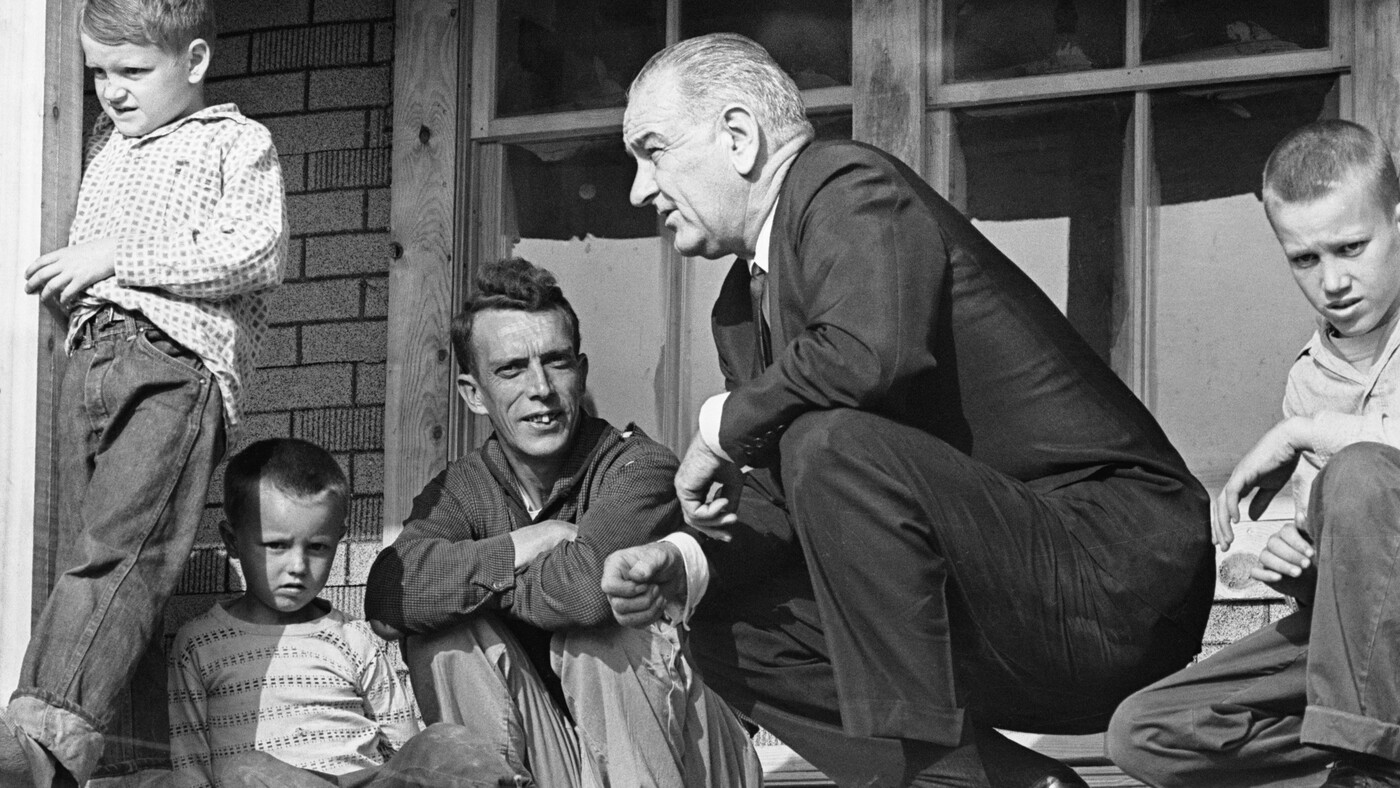 |
| LBJ came down to Kentucky to start the war on poverty. Fifty years on, there's much left to be done, and job prospects are worse. |
In an article two years ago, NPR talked about the plight of Kentuckians who fell through the cracks as coal mining jobs died out. People were getting by with state and federal aid but resented those they thought didn't deserve it:
Today, many people here rely on government aid. In fact, it's the largest source of income in Martin County. People say it has helped to reduce hunger, improve health care and give young families a boost, especially at a time when coal-mining jobs are disappearing by the hundreds.
...
Thomas Vinson, a Martin County resident for 41 years, used to work in the coal fields, but he is currently unemployed. Vinson says he has a big house payment and three sons to raise. Times are tough, he says, but "we are making it."
One reason is that Vinson's wife got a job at a gear factory through a federally funded program to help unemployed miners. Vinson is grateful for the short-term help but worried about his future. In the big picture, he's disappointed in the war on poverty. He says he sees too many people around here just collecting checks.
"They call it poverty, but I call it abusing the system. Like, if you're going to file for SSI, you go in there and say the right things, you'll come out of there with a check," he says.
His feelings are widespread around here: What good are all these government programs if they don't get you a job?The disconnect is palpable and widespread. I'm on welfare, but it's the other guy collecting it that's the slacker. That's what wrong with government aid. So they vote for someone they think is going to end the aid. As for Martin County? The jobs are still gone. Then the aid is gone.
And so it came to pass that Kentuckians voted in droves for Donald Trump. What will they likely get? They'll get the world of their dreams: the end of or drastic cuts to aid programs that have been keeping them barely alive. And jobs? What jobs? There are no jobs in places like Martin County and aren't likely to be any any time soon.
And yet they keep voting against their interests, says WaPo's Catherine Rampell:
Why did all those Economically Anxious™ Trump voters reject policies that would have helped relieve their economic anxiety?
Maybe they believed any Big Government expansions would disproportionately go to the “wrong” kinds of people — that is, people unlike themselves.There are other groups that draw the working class's ire: professionals. Oddly, professionals, whom working people see all the time, are resented, while they rarely encounter the rich, whom they admire:
One little-known element of that gap is that the white working class (WWC) resents professionals but admires the rich. Class migrants (white-collar professionals born to blue-collar families) report that “professional people were generally suspect” and that managers are college kids “who don’t know shit about how to do anything but are full of ideas about how I have to do my job,” said Alfred Lubrano in Limbo. Barbara Ehrenreich recalled in 1990 that her blue-collar dad “could not say the word doctor without the virtual prefix quack. Lawyers were shysters…and professors were without exception phonies.” Annette Lareau found tremendous resentment against teachers, who were perceived as condescending and unhelpful.
Michèle Lamont, in The Dignity of Working Men, also found resentment of professionals — but not of the rich. “[I] can’t knock anyone for succeeding,” a laborer told her. “There’s a lot of people out there who are wealthy and I’m sure they worked darned hard for every cent they have,” chimed in a receiving clerk. Why the difference? For one thing, most blue-collar workers have little direct contact with the rich outside of Lifestyles of the Rich and Famous. But professionals order them around every day. The dream is not to become upper-middle-class, with its different food, family, and friendship patterns; the dream is to live in your own class milieu, where you feel comfortable — just with more money. “The main thing is to be independent and give your own orders and not have to take them from anybody else,” a machine operator told Lamont. Owning one’s own business — that’s the goal. That’s another part of Trump’s appeal.In the end, the voters get what they deserve if not what they expect. If the white working class listens very carefully, they'll hear Trump's cabinet -- and the Republican Congress -- making plans to cut taxes on the rich, end Obamacare, and cut Medicaid, Medicare, and Social Security. Unfortunately, too many of them are listening to Rush Limbaugh, Alex Jones, and Fox News to hear anything resembling reality. And that reality will hit them in the face soon enough. Can Trump and his Congress blame everything on Obama? They will sure as hell try.
Will they succeed? Don't be surprised. They're primed to blame the black man.
Yes, this Glenn Beck video is from quite a while ago, but here's Bill O'Reilly two days ago:
Yeah, Bill, minorities and women and voters in the cities are bad! And white, rural male voters good! Thanks for making this clear for us people who can do math:
voters - minorities, women, city dwellers = white male rural voters
...who, of course, should rule our country, also known as the white establishment! Hmm. When you put it like that... We might be screwed.

No comments:
Post a Comment